Affiliate Disclaimer
Some links in this article are affiliate links. We may earn a small commission if you make a purchase through these links, at no extra cost to you. We only recommend products we find useful to our readersWhen it comes to sleeping patterns, chances are that nothing is set in stone. At the same time, some need firm pillows and a cozy mattress, and some love sleeping on the floor for better health. But did you ever wonder what happens if you sleep on the floor?
Don’t worry, though. The impacts of sleeping on the floor are primarily beneficial. It all comes down to your sleeping posture and the climate that makes the difference.
Here, we will highlight some of the benefits and disadvantages of sleeping on the floor.
What Happens if You Sleep On the Floor?
Sleeping on the floor can cause back pain if you do it out of the blue. But that is just in the initial days, following which the impacts are minimized and you start experiencing the benefits of sleeping on the floor.
That said, weighing the risks and benefits together is essential to make an informed decision about your health.
Benefits of Sleeping on the Floor
Before pointing out the risks, we must highlight the amazing benefits that you experience with them.
Let us look at some of the most important ones:
1. Reduces Back Pain

One of the first and most important health effects of sleeping on the floor is that it helps reduce complaints about back pain.
While many conclusive studies are lacking, it is believed that improved posture reduces back pain due to the alignment it provides.
The floor’s hard surface forces your body to always stay in a straight and aligned position, helping reduce the back pain you have been complaining of.
Indeed, you are likely to experience back pain in the initial days when you switch from the mattress to the floor, but it gets better over time.
2. Might Treat Sciatica

Sciatica is a condition characterized by constant pain around the sciatic nerves, which then radiates down the back and runs down the hips. Constant sciatic pain negatively impacts one’s overall well-being.
Much like back pain, sciatica is often worsened when you sleep on firmer or even extra-soft mattresses. No conclusive studies justify why sleeping on the floor can help with the condition, but the results do bring forth necessary improvements.
Many believe that sleeping on the floor improves the alignment of the back and spine, which further enhances results and aids in healing.
3. Might Improve Posture

You might not realize this, but one of the telltale benefits of sleeping on the floor is its amazing impact on posture. Not only does it help improve overall alignment, but it has also been found to help with overall posture.
Since your body is against the hard floor, it has been found to have beneficial impacts in helping improve the back pain and constant discomfort that you might be experiencing.
Sleeping on the floor for back pain is one of the primary reasons why it can also help with posture.
Also, Read: What Happens When You Sleep Next to Someone
4. Aligns the Hips and Shoulders

If you have issues with the alignment of your hips and shoulders, one of the most common and effective impacts it has is in helping align the hips and shoulders.
It would help to focus on starting by sleeping on the floor gradually and then consistently doing so. That is what makes all the difference and can impact your overall results.
Misalignment of the spine often causes the pain and discomfort you struggle with, leading to constant issues with the hips and shoulders.
If you consistently take it lightly, chances are that the same will cause chronic pain that often becomes unbearable over time.
5. Better Rest and Relaxing

Not many realize this, but sleeping on the floor has been found to have a better impact on helping you wake up fresh and rejuvenated. If you are wondering what happens if you sleep on the floor, chances are that you will feel more energised when you wake up.
This is believed for all sorts of weird reasons. For the most part, since we feel a lot more comfortable on the mattress, we are likely to sleep more and hit the snooze button, waking up groggy.
On the other hand, since sleeping on the floor isn’t necessarily the most comfortable experience, it has been found to directly impact waking up with the alarm, making you feel fresher and more energized to take on the day.
6. Might Help with Insomnia
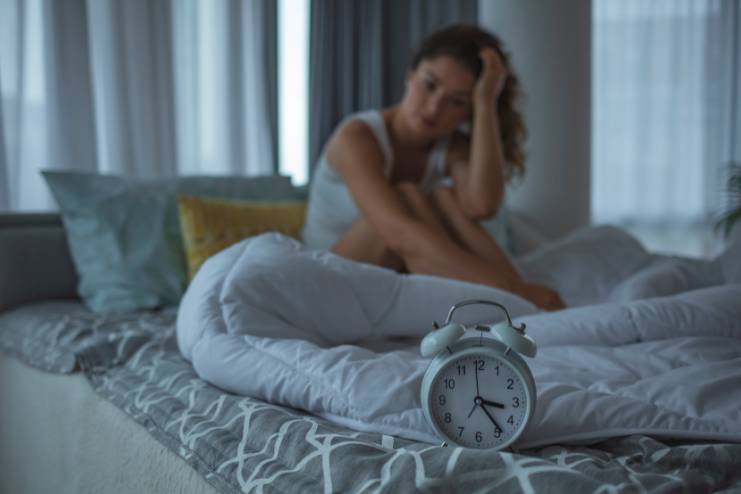
While there aren’t any specific studies that clarify the claims of a relation between insomnia and the effects of sleeping on the floor, it is believed that it can actually be helpful.
For those who have been experiencing issues with the mattress and complaining about its impacts on the body, switching to sleeping on the floor can actually be beneficial for overall well-being.
Next Read Up: What Happens If You Sleep for 6 Hours a Day
7. Promotes Better Spine Health

Our spine plays a crucial role in not just helping improve posture but also getting rid of the issues associated with constant pain and discomfort.
One of the most common health effects of sleeping on the floor is that it effectively promotes better spine health.
Since your spine is aligned straight when sleeping on the floor, this has beneficial impacts on any issues that you might have with your spine consistently.
But, also make sure that you consult a doctor first whether sleeping on the floor is ideal for you if you struggle with serious spine problems.
8. Can Control Body Temperature
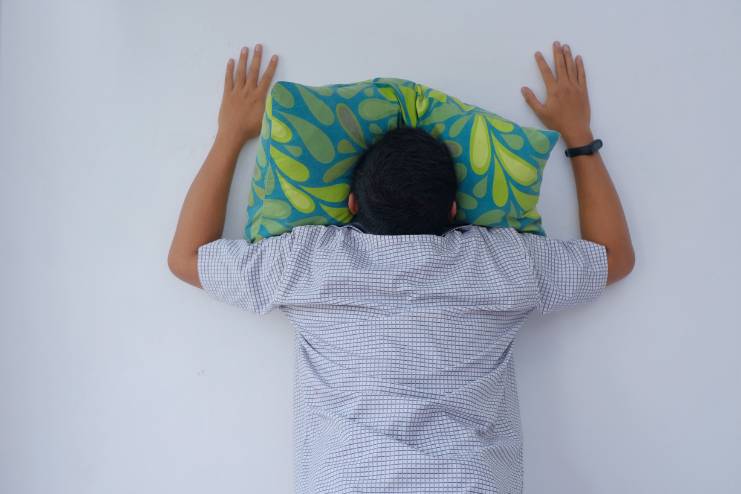
One of the most common issues with labored sleeping cycles that many encounter is that their body tends to overheat because of the thick mattress.
Overheating the body is one of the most common issues regarding the affected sleeping cycles. Experts suggest sleeping on the ground for better and faster recovery.
Always make sure to focus on adhering to the sleeping patterns that you know will help with your problems and not worsen them.
Also, Read: Stretches To Do Before Bed for Peaceful Sleep
How to Sleep on the Floor Properly?
If you are planning on witnessing what happens if you sleep on the floor, we suggest that you have a set plan that you execute before managing your sleeping pattern completely.
This is what makes all the difference.
Some of the important insights on this include:
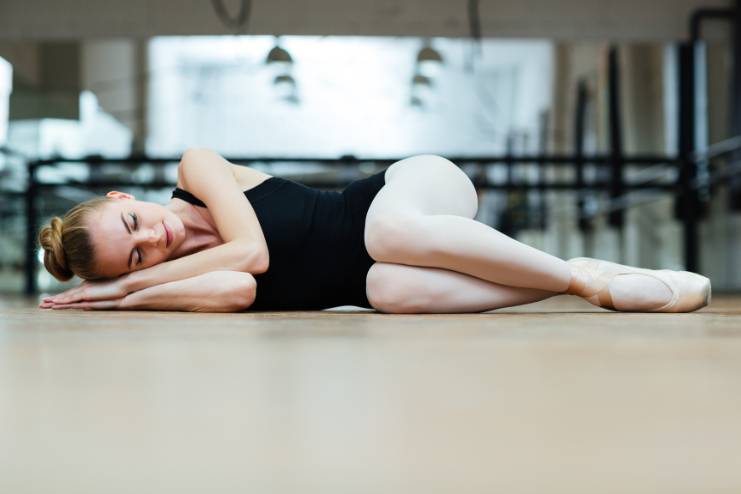
Prepare for The Deed
The very first and possibly the most important part of the task is to be prepared. You want to ensure that you prepare accordingly and get the necessary items. From the blankets to the fleece tops and bottoms that are necessary for sleeping, you need to be prepared with all the possible essentials for a comfortable sleep at night.
Focus on the Floor
Sleeping on the floor can mean directly resting on the floor, but it is not necessarily the ideal option. Make sure that you focus on getting at least some form of minimal padding, especially if you stay somewhere where it is too cold to act on. Apart from the thicker blankets, you can use foam mattress toppers and even floor sleeping mats for a comfortable sleep unlike anything else.
Focus on the Sleeping Position
You will likely toss and turn and not sleep in a steady position, but you might also expect to do so. Whatever the case, it is very important that you have a static sleeping position that you feel the most comfortable sleeping on. It doesn’t matter whether you are sleeping on your side, back, or stomach. Just ensure that you are comfortable whichever way you are sleeping.
Possible Disadvantages of Sleeping on the Floor
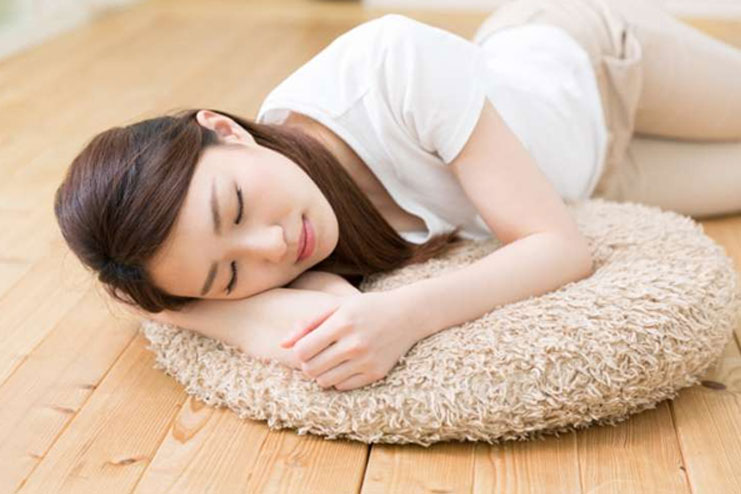
The custom of sleeping on the floor, with its origins in various cultures, has gained popularity due to its potential health benefits, despite sounding unconventional to some. However, it’s important to note that this practice is not without its drawbacks. Let’s delve into a comprehensive discussion of the potential disadvantages of sleeping on the floor.
1. Initial Discomfort
One of the most immediate drawbacks of sleeping on the floor is the discomfort you experience at the beginning of the night. Because most people are accustomed to the plushness of a mattress, transitioning to a hard floor can be rather challenging. The body needs time to adjust to the hardness, which may result in a few nights of sleep disrupted by restlessness. Due to the absence of cushioning, it may be challenging to find a comfortable position, which may result in the individual tossing and turning throughout the night.
2. Risk of Pressure Points

When one sleeps on the floor throughout the night, pressure points are more likely to develop in the hips, shoulders, and knees. This is because these areas are more likely to suffer from pressure. Because they do not have the support of a mattress, these places are the ones that bear the brunt of your body weight. The lack of give in the floor to alleviate pressure could lead to discomfort and even pain for the individual. In addition to the fact that this may, over time, result in discomfort, it also has the potential to develop pressure sores, particularly for individuals who sleep on their sides.
3. Cold Floors
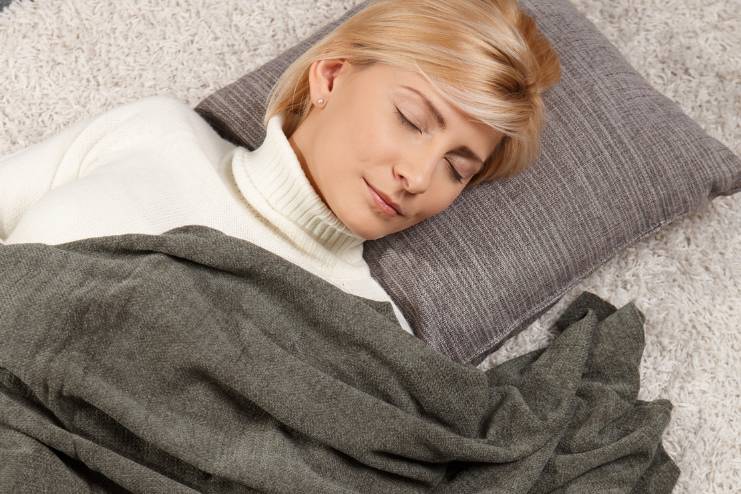
Floors may be significantly colder than beds, especially during the winter months. It would help if you consider this factor. The experience of sleeping on a cold surface can be uncomfortable and may interrupt one’s sleep or sleep patterns. As a result of the body coming into contact with a cold floor, the pace at which heat is lost rises, which may be the source of the alertness associated with chills. Although mats, rugs, or blankets mitigate this issue, those contemplating sleeping on the floor must consider it.
4. Hygiene Concerns

One more thing that needs to be taken into consideration when it comes to sleeping on the floor is the importance of maintaining proper cleanliness. Individuals who suffer from respiratory diseases or allergies may be concerned about the possibility of dust, filth, and allergens becoming trapped in floors. This is because these substances can become trapped. Even with consistent cleaning, it is impossible to maintain a floor that is on par with the cleanliness of a bed for a lengthy period of time. Sleeping in such close contact with the ground could increase the risk of being exposed to allergens, which could result in health concerns in the long term.
5. Difficulty Getting Up
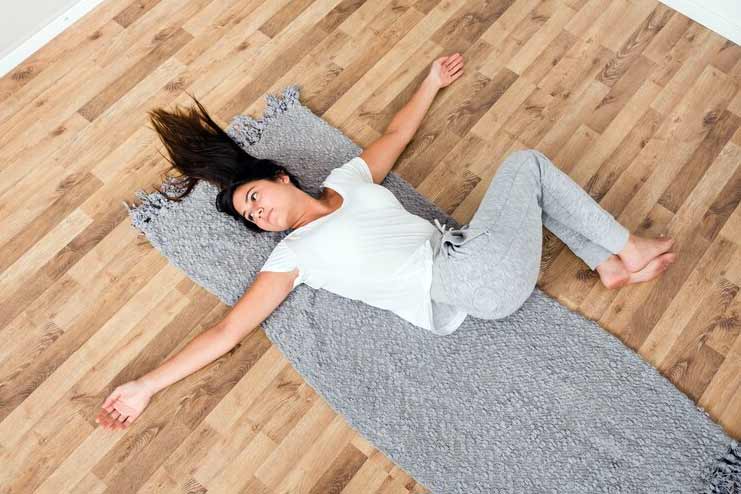
Getting up from the floor may be more challenging than getting out of bed, especially for people who are elderly or who have issues with their movement. This is especially true for people who have difficulty moving around. As a result of the lack of height, standing up demands a greater amount of effort, which might be difficult to accomplish first thing in the morning when there is no elevation. Not only does this have the potential to result in a transition into the day that is less seamless, but it also has the potential to cause strain or injury.
6. Potential for Increased Back Pain

On the other hand, some people find that sleeping on the floor helps them feel better about their back discomfort, while others find that it has the opposite impact on them. The spine might only maintain proper alignment with the support and cushioning provided by a mattress. In particular, persons who already have prior ailments or have poor posture may experience a worsening of their back discomfort as a consequence. When it comes to making adjustments, it is of the highest significance to pay attention to the signals your body tells you and make adjustments as necessary.
7. Impact on Sleep Quality

Several factors, including discomfort, the cold, and the risk of pressure points, can cause evenings filled with restlessness and poor-quality sleep. Repeatedly not getting enough sleep can lead to a number of health issues, some of which include a decrease in cognitive performance, mental disorders, and an impaired immune system, amongst other potential repercussions.
More Recommended Articles to Read:
-
June 2020Written by Somapika D
-
Aug 2024Edited by Ankita
In this Article





















